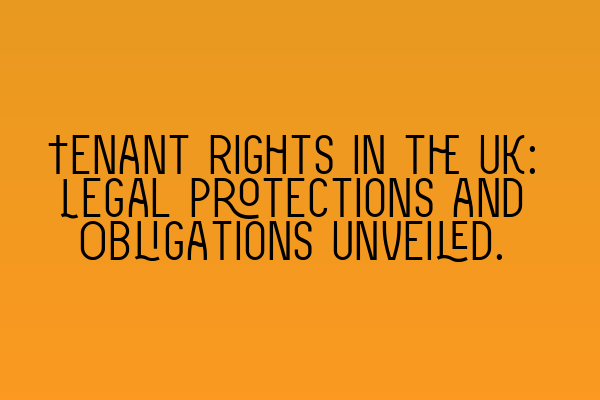Tenant Rights in the UK: Legal Protections and Obligations Unveiled
As a tenant in the UK, it is crucial to understand your rights and legal protections. This knowledge will empower you to confidently assert your rights and ensure a fair and satisfactory tenancy agreement. In this blog post, we will unveil the key legal protections and obligations that tenants should be aware of.
1. Security of Tenure:
One of the fundamental rights of a tenant in the UK is the security of tenure. This means that as a tenant, you have the right to live in your rented property for a certain period without the fear of arbitrary eviction. The security of tenure gives you the stability and peace of mind to create a secure and comfortable home for yourself.
2. Rent Payments:
Rent payments are an essential aspect of the tenant-landlord relationship. It is important to understand the terms of your rental agreement regarding rent payments, including the frequency and the method of payment. Always keep records of all rental payments as proof of transactions. In case of any disputes or issues regarding rent payments, it is advisable to seek legal advice from a property law specialist.
3. Repairs and Maintenance:
Another crucial aspect of a tenant’s rights is the right to a safe and habitable living environment. Landlords have an obligation to ensure that the property is in good repair and fit for occupancy. If there are any maintenance issues or repairs needed in your rented property, it is your right as a tenant to inform the landlord promptly. The landlord is then responsible for addressing these issues promptly and adequately.
4. Deposit Protection:
When entering into a tenancy agreement, landlords usually require a deposit from the tenant. This deposit is held as security against any damages or unpaid rent at the end of the tenancy. It is important to ensure that your landlord protects your deposit in a government-approved tenancy deposit protection scheme. This scheme protects your deposit from any unjust deductions and ensures its safe return at the end of the tenancy.
5. Notice Periods:
Both tenants and landlords have specific notice periods that they must adhere to when terminating a tenancy agreement. It is crucial to understand these notice periods as they vary depending on the type of tenancy and the circumstances involved. Being aware of the notice periods will help you plan your move-out and transition effectively, while also ensuring that your rights are protected.
6. Privacy and Rights of Entry:
As a tenant, you have the right to privacy and peaceful enjoyment of your rented property. Landlords must respect this right and cannot enter the property without prior notice, except in emergencies. It is important to familiarize yourself with the terms of your tenancy agreement regarding landlord access and entry rights to avoid any potential infringements on your privacy.
7. Discrimination and Harassment:
As a tenant, you have the right to be treated fairly and without discrimination. Discrimination based on factors such as race, gender, religion, disability, or sexual orientation is strictly prohibited and illegal. If you feel that you have been discriminated against or harassed by your landlord, it is essential to seek legal advice immediately to protect your rights and take appropriate action.
8. Seeking Legal Advice:
Understanding your rights as a tenant can be complex, especially when navigating the nuances of property law. If you encounter any issues or disputes with your landlord, it is advisable to seek legal advice from a property law specialist. They can guide you through the legal processes, help resolve any disputes, and ensure that your rights are protected.
In conclusion, as a tenant in the UK, it is vital to be aware of your rights and legal protections. By understanding the key legal obligations for both tenants and landlords, you can ensure a fair and satisfactory tenancy agreement. Remember to seek legal advice when needed and be proactive in asserting your rights as a tenant.
Related Articles:
– SQE 1 Practice Exam Questions
– SQE 1 Practice Mocks FLK1 FLK2
– SQE 2 Preparation Courses
– SQE 1 Preparation Courses
– SRA SQE Exam Dates
